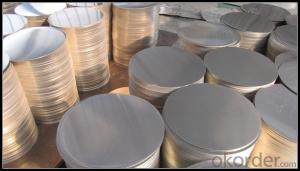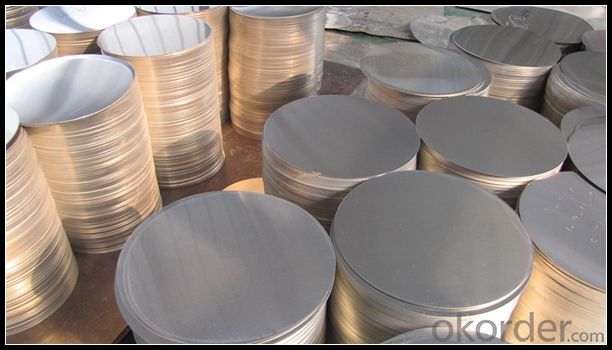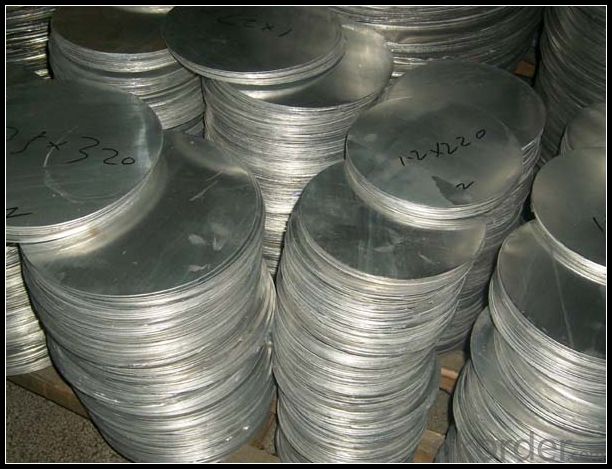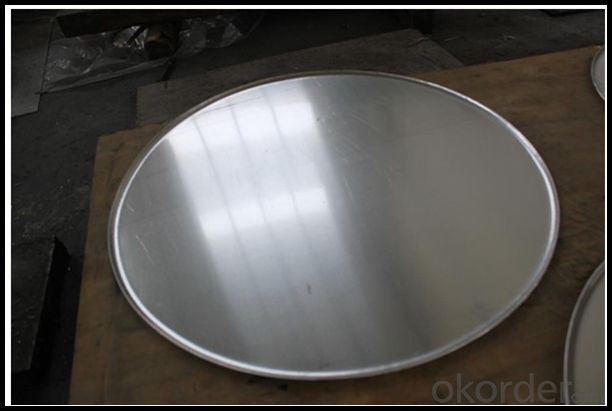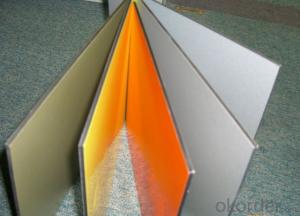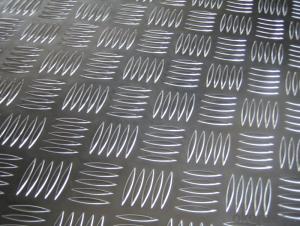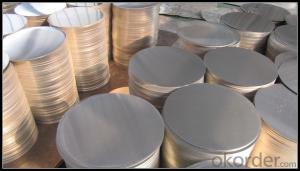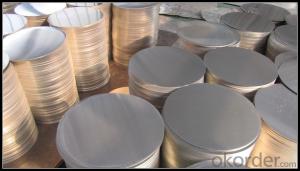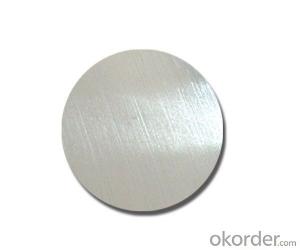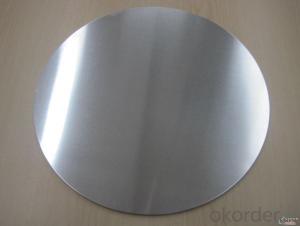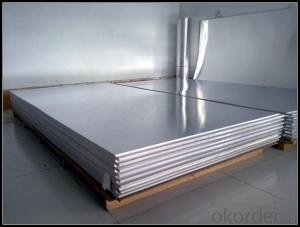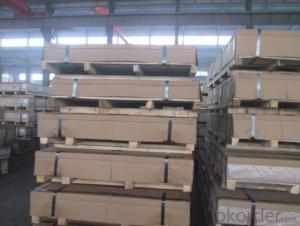Aluminum Sheets for Sale Edmonton - Deep Drawing Hot Sale China Cheap Price 1100 Aluminium Circle Sheet
- Loading Port:
- Shanghai
- Payment Terms:
- TT OR LC
- Min Order Qty:
- 4 m.t.
- Supply Capability:
- 5000 m.t./month
OKorder Service Pledge
OKorder Financial Service
You Might Also Like
Specification
1) Alloy | 1050, 1060,1100, 3003 3004 3105 3005 5005 5052 etc |
2) Temper | O/H12/H14/H1/H18/H32/H34/H36/H38//H111/H112/H116/H321/T6/T651/T3/T351 etc |
3) Thickness | 0.1mm to 6mm |
4) Width | 20mm to 3300mm |
5) Coil weight | 100kgs to 6 tons depends on actual requirement |
6) Core material | Aluminum alloy |
7) Coil Inner diameter | 76mm, 152mm,or as required |
2. Application of Aluminum
(1).Interior: wall cladding, ceilings, bathrooms, kitchens and balconies, shutters, doors...
(2).Exterior: wall cladding, facades, roofing, canopies, tunnels,column covers , renovations...
(3).Advertisement: display platforms, signboards, fascia, shop fronts...
3. Feature of Aluminum
We are able to supply 1,2,3,5,6,8 series alloy coil, foil and sheets, including 1***, 3***, 3104, 5052, 5182, 5754, 5083,5086,8011,8079
Our products include:
1). Mill-finished aluminum coil:
Alloy: AA1050, 1060, 1100, AA3003, 3005, 3015, 5052, 5754, 5083,8011 ,8079etc.
Temper: H14/16/18/22/24/32, HO etc.
Thickness: 0.08mm—100mm
Width: 100mm—2200mm (Can be slitted)
Notice: Embossment can be done if required.
2). Color-Coated Aluminum Coil:
Alloy : AA1050/1100/3003/3005/3105/5005/5052/8079 etc.
Thickness: 0.03mm—1.50mm
Width: 10mm—1600mm (Can be slitted)
Coating : PVDF, PE
Coating thickness: Usually 16-25 micron, could be33-40 micron
Color : According to customers’ requirements
Notice : Embossment can be done if required
4. Certificate:
SGS and ROHS(if client request, paid by client), MTC(plant provided), Certificate of Origin(FORM A, FORM E, CO), Bureau Veritas and SGS (if client request, paid by client), CIQS certificate
5. Image of Aluminum
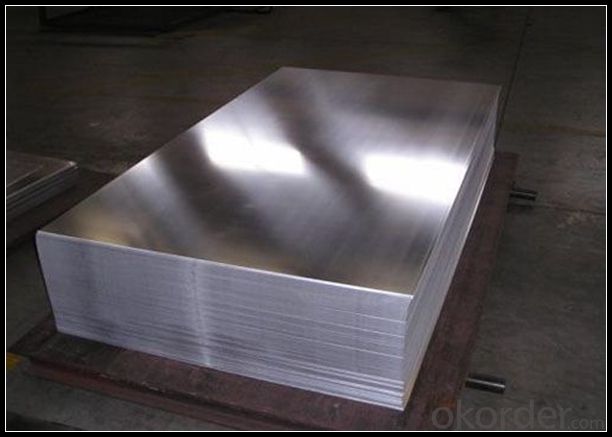
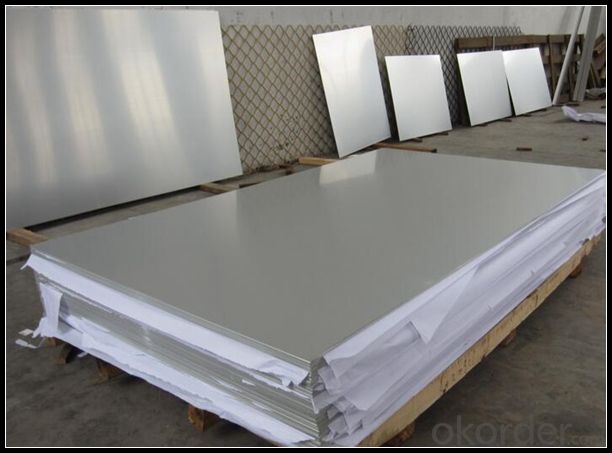
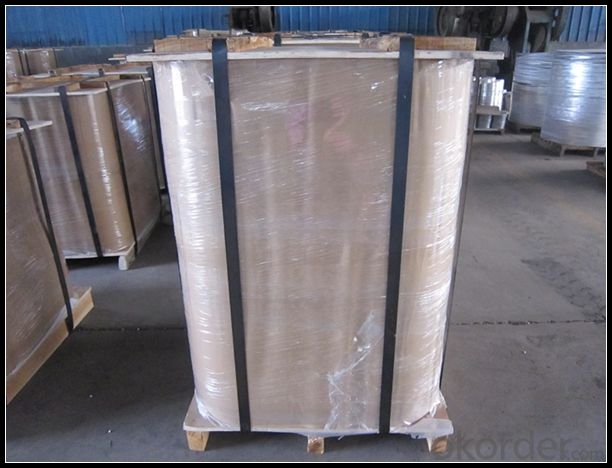
6. Our Service
1. Reply your enquiry in 24 working hours. |
2. OEM, buyer design, buyer label services provided. |
3. Exclusive and unique solution can be provide to our customer by our well traned and professional engineers and staffs. |
4. We can provide free sample for your check |
5. We have the certification of ISO 9001 |
6. Timely delivery |
7. Special discount and protection of sales area provided to our distributor. |
8. Good after-sale service. |
7. FAQ
Q: What is the produce prase? |
A: Normally it would be 40days after received your deposit. |
Q: Can you provide free samples? |
A: Yes, free samples will be sent to you on freight at destination. |
Q: Can I get your latest catalogue? |
A: Yes, it will be sent to you in no time. |
Q: What is the MOQ? |
A: 3 tons |
Q: What are your payment terms? |
A: We accept L/C, D/A, D/P, T/T, West Union,etc |
- Q: Can aluminum sheets be an alternative to glass in certain applications?
- Certain applications can consider aluminum sheets as an alternative to glass. Aluminum sheets provide various benefits over glass, making them suitable for specific scenarios. To begin with, aluminum sheets possess lightweight and durable characteristics, making them an excellent choice for industries like aerospace or automotive, where weight is a concern. Conversely, glass is relatively heavy and brittle, limiting its usage in certain environments. Moreover, aluminum sheets exhibit exceptional resistance to corrosion, making them a suitable option for marine or coastal applications, where glass may deteriorate over time due to exposure to saltwater. Aluminum sheets also possess a high strength-to-weight ratio, enabling greater design flexibility and structural integrity compared to glass. Furthermore, aluminum sheets offer superior thermal insulation properties in comparison to glass. They provide improved resistance to heat transfer, which is advantageous in applications where temperature control is crucial, like the construction industry. Additionally, aluminum sheets can be more cost-effective than glass in specific applications. The production and installation costs of aluminum sheets are often lower than glass, making them a more economical choice for large-scale projects. However, it is important to acknowledge that glass retains its own unique properties and advantages, such as transparency and optical clarity. Glass also has better resistance to scratches and chemical corrosion when compared to aluminum sheets. In conclusion, while aluminum sheets can serve as a viable alternative to glass in certain applications due to their lightweight, durability, corrosion resistance, thermal insulation properties, and cost-effectiveness, the final decision between the two materials depends on the specific requirements and limitations of the application at hand.
- Q: A dry aluminium foil paper can be bring out from oven with no burn on finger but if foil has some moisture it will result in burn why?
- It isn't the foil that is burning you--it's the water. Aluminum foil is a good heat conductor. This means that when you expose the foil to the air, it will cool off very rapidly (rapidly reaching room temperature). Water is NOT a good heat conductor, in fact, it likes to hold onto it's heat. So while the dry foil may come to room temperature (or just warm to the touch) in a few seconds, the water will stay hot for much longer (depending on how much water there is obviously). It's really the same as trying to grab a baked potato wrapped in foil off of the grill. If you grab the potato you will burn your hand (because the potato is holding A LOT of heat), but if you carefully peel away the foil, you can touch and take the foil off with your bare hand. I should say that the mass of the foil also plays a role here. The foil is not very massive and thus does not hold a lot of raw energy to begin with (also because it's a good heat conductor it dissipates quickly). Bu if you put an aluminum can (or a brick of aluminum) in the oven, I guarantee that it would stay hotter for much longer than just a piece of aluminum foil.
- Q: What are the different methods of surface cleaning for aluminum sheets?
- There are several methods of surface cleaning for aluminum sheets, each with its own advantages and suitability for different types of cleaning needs. 1. Mechanical Cleaning: This method involves using mechanical abrasion techniques to remove dirt, stains, and oxidation from the surface of aluminum sheets. It can be done using brushes, abrasive pads, sandpaper, or a wire brush. Mechanical cleaning is effective for removing heavy dirt or oxidation, but it may leave scratches on the surface if not done carefully. 2. Chemical Cleaning: Chemical cleaning involves the use of specific cleaning agents or solutions that are designed to dissolve or remove dirt, grease, oil, or other contaminants from aluminum surfaces. These cleaning agents can vary depending on the type of dirt or stain being removed. For example, alkaline cleaners are effective for removing oil and grease, while acidic cleaners can remove mineral deposits or oxidation. It is important to follow the manufacturer's instructions and safety precautions when using chemical cleaners. 3. High-Pressure Water Cleaning: This method utilizes a high-pressure water jet to clean the aluminum surface. The force of the water helps to dislodge dirt or grime from the sheet. High-pressure water cleaning is particularly useful for removing loose debris or light dirt from larger areas. However, it may not be suitable for heavily soiled or oxidized surfaces. 4. Steam Cleaning: Steam cleaning involves using high-temperature steam to remove dirt, grime, or other contaminants from aluminum sheets. The steam helps to loosen the dirt, making it easier to wipe or rinse away. Steam cleaning is effective for removing grease, oil, or other stubborn stains. It is a versatile method that can be used on both small and large surfaces. 5. Electrolytic Cleaning: Electrolytic cleaning is a specialized method that uses an electric current to remove contaminants from the aluminum surface. The aluminum sheet is immersed in a cleaning solution, and an electric current is passed through it. This causes the contaminants to be attracted to a sacrificial electrode, leaving the aluminum sheet clean. Electrolytic cleaning is effective for removing heavy oxidation or corrosion, but it requires specialized equipment and expertise. It is important to consider the specific cleaning requirements, the condition of the aluminum sheet, and the desired level of cleanliness when choosing the appropriate method of surface cleaning. It is also advisable to test the chosen method on a small, inconspicuous area first to ensure compatibility and avoid any potential damage to the aluminum sheet.
- Q: Can aluminum sheet be used in marine environments?
- Yes, aluminum sheet can be used in marine environments. Aluminum is a popular material choice for marine applications due to its excellent corrosion resistance. It forms a protective oxide layer on its surface, which helps to prevent further corrosion even in saltwater environments. Additionally, aluminum is lightweight, which makes it an ideal choice for marine applications where weight reduction is crucial. Aluminum sheet is commonly used in boat hulls, decks, and other marine structures due to its durability, strength, and resistance to corrosion.
- Q: This question asks for a guide on the correct procedure to install aluminum sheets, likely for construction or renovation purposes.
- <p>To install aluminum sheets properly, follow these steps: 1. Prepare the surface by cleaning and leveling it. 2. Measure and cut the aluminum sheets to the required size using a metal saw or tin snips. 3. Apply a bead of construction adhesive along the edges of the surface where the sheets will be placed. 4. Position the aluminum sheet, ensuring it's aligned correctly. 5. Secure the sheet with screws or nails, using a washer to prevent tearing. 6. Seal the seams and edges with a weatherproof sealant to prevent water ingress. 7. Inspect the installation for any gaps or unevenness and make adjustments as needed. Always follow the manufacturer's guidelines and safety precautions while working with aluminum sheets.</p>
- Q: Can the aluminum sheets be used for manufacturing food storage containers?
- Yes, aluminum sheets can be used for manufacturing food storage containers. Aluminum is a popular choice for food storage containers because it is lightweight, durable, and has excellent thermal conductivity. It can easily be formed into various shapes and sizes, making it suitable for different types of food storage needs. Additionally, aluminum is resistant to corrosion and can be easily cleaned, ensuring the safety and hygiene of the stored food.
- Q: Hello,Does it matter what kind of wheel I use as a cut off wheel on an angle grinder when cutting aluminum?Thanks!
- Most cut-off wheels are grinding wheels. They get clogged up quickly with aluminum dust. A saw is a better idea.
- Q: How do aluminum sheets perform in terms of thermal expansion and contraction?
- Aluminum sheets have a relatively high coefficient of thermal expansion, meaning they expand and contract more than most other materials when exposed to heat or cold. The coefficient of thermal expansion for aluminum is approximately 23 x 10^-6 per degree Celsius. This means that for every degree Celsius increase in temperature, aluminum will expand by 23 millionths of its size. This thermal expansion and contraction property of aluminum makes it suitable for various applications where temperature fluctuations are expected. For instance, in the construction industry, aluminum sheets are commonly used for roofing and cladding purposes. These sheets can withstand the thermal stresses caused by the changing temperatures without warping or distorting significantly. Moreover, this characteristic of aluminum also makes it ideal for manufacturing products like cookware and heat sinks. Aluminum cookware heats up quickly and evenly due to its high thermal conductivity and expands uniformly, preventing warping or deformation when exposed to heat. Similarly, aluminum heat sinks effectively dissipate heat generated by electronic components, as they can accommodate thermal expansion without compromising their structural integrity. However, it is important to note that while aluminum sheets have good thermal expansion and contraction properties, extreme temperature changes can still lead to some dimensional changes. Therefore, proper consideration of the anticipated temperature variations is crucial when designing and using aluminum sheets to ensure their optimal performance and longevity.
- Q: Are the aluminum sheets suitable for manufacturing heat exchangers?
- Yes, aluminum sheets are suitable for manufacturing heat exchangers due to their excellent thermal conductivity, lightweight nature, and corrosion resistance.
- Q: What are the applications of aluminum sheet?
- Aluminum sheets have a wide range of applications due to their unique properties and versatility. Some of the common applications of aluminum sheets include: 1. Construction: Aluminum sheets are widely used in the construction industry for roofing, siding, and cladding purposes. Their lightweight nature makes them easy to handle and install, while their corrosion resistance ensures long-lasting durability. 2. Transportation: Aluminum sheets are extensively used in the automotive industry for manufacturing vehicle bodies, panels, and structural components. Their high strength-to-weight ratio helps reduce the overall weight of vehicles, increasing fuel efficiency and improving performance. 3. Packaging: Aluminum sheets are commonly used in the packaging industry for manufacturing cans, foils, and containers. Aluminum foils are used for food packaging, as they provide a barrier against moisture, light, and oxygen, ensuring the freshness and safety of the packaged products. 4. Electrical: Aluminum sheets are used in the electrical industry for manufacturing power transmission lines, busbars, and electrical enclosures. Their excellent electrical conductivity helps in the efficient transmission of electricity, while their corrosion resistance ensures longevity in outdoor applications. 5. Marine: Aluminum sheets are widely used in the marine industry for manufacturing boat hulls, decks, and superstructures. Their resistance to corrosion from saltwater makes them ideal for marine applications, while their lightweight nature helps reduce the overall weight of the vessel. 6. Aerospace: Aluminum sheets are extensively used in the aerospace industry for manufacturing aircraft and spacecraft components. Their high strength-to-weight ratio and excellent thermal conductivity make them suitable for applications where weight reduction and heat dissipation are critical. 7. Heat exchangers: Aluminum sheets are used in the manufacturing of heat exchangers, such as radiators and condensers. Their high thermal conductivity allows for efficient heat transfer, making them ideal for applications where heat exchange is required. 8. Decorative: Aluminum sheets are commonly used in interior design and architectural applications for decorative purposes. They can be easily shaped, bent, and formed into various designs, adding a modern and aesthetic appeal to buildings and interiors. Overall, aluminum sheets find applications in various industries due to their lightweight nature, corrosion resistance, high strength-to-weight ratio, and excellent thermal conductivity.
Send your message to us
Aluminum Sheets for Sale Edmonton - Deep Drawing Hot Sale China Cheap Price 1100 Aluminium Circle Sheet
- Loading Port:
- Shanghai
- Payment Terms:
- TT OR LC
- Min Order Qty:
- 4 m.t.
- Supply Capability:
- 5000 m.t./month
OKorder Service Pledge
OKorder Financial Service
Similar products
Hot products
Hot Searches
Related keywords
